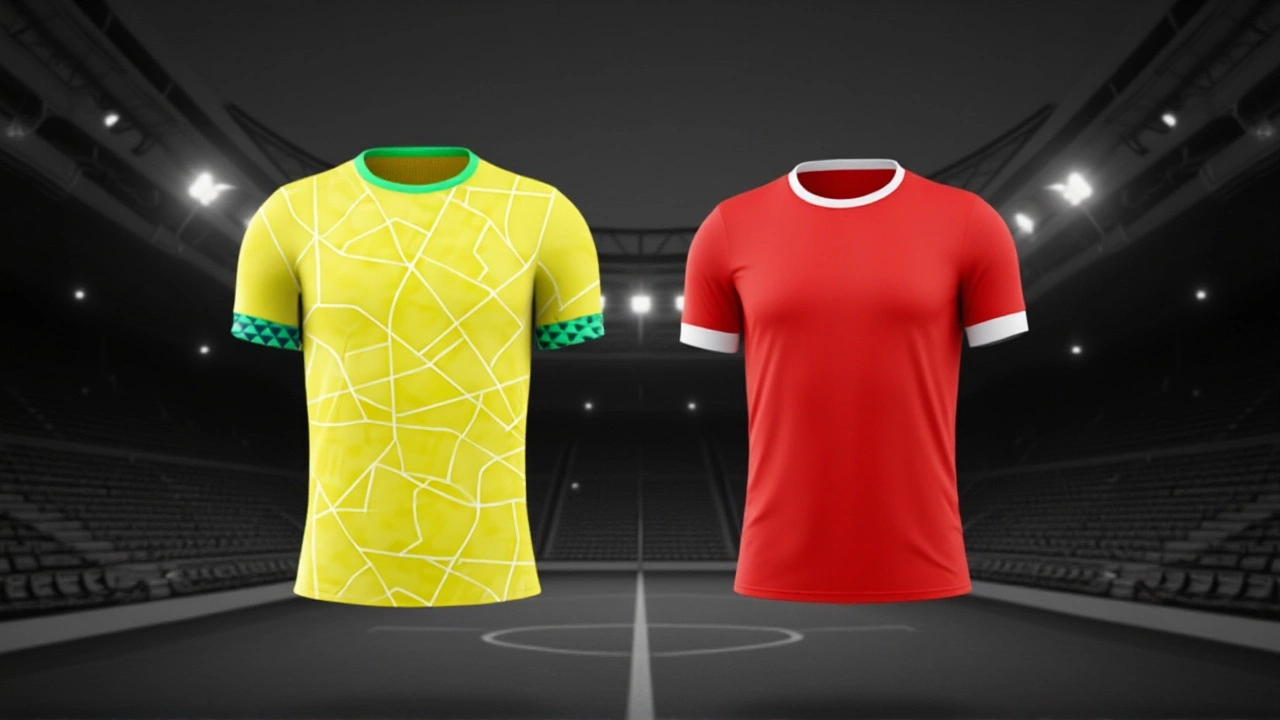It wasn’t a win, but it was exactly what both teams needed. On the international friendly between Brazil and Tunisia, played on Tuesday, November 18, 2025, the two sides settled for a 1-1 draw — a result that told more about preparation than pride. Estêvão, the 18-year-old Brazilian forward making his first start for the national team, converted a 44th-minute penalty to cancel out Hazem Mastouri’s 23rd-minute strike for Tunisia. The final whistle blew at 90’+5’, after Estêvão rattled the left post with a curling right-footed shot from the right side of the box, assisted by Fabinho. The match, held at an undisclosed venue, served as a critical final tune-up for both squads ahead of their respective continental tournaments in 2026.
Two Teams, One Goal: Preparation Over Results
For Brazil, this was less about winning and more about integration. Coach Dorival Júnior used the match to blend youth with experience. Estêvão, a rising star from São Paulo FC, was thrust into the starting lineup alongside established names like Vinícius Júnior (Real Madrid) and Marquinhos (Paris Saint-Germain). The formation shifted throughout the game — sometimes 4-3-3, sometimes 4-2-4 — as the staff tested combinations ahead of the 2026 FIFA World Cup qualifiers.
Tunisia, meanwhile, was on a different mission. As reported by Africa Soccer on November 1, 2025, the match was deliberately scheduled during the November international break as their final competitive rehearsal before the 2025 Africa Cup of Nations, set for early 2026. Coach Jalel Kadri wanted to test his squad against elite opposition, especially in high-pressure moments like set pieces and counterattacks. Mastouri’s goal — a clinical finish after a quick break — showed Tunisia’s attacking potential, but the defense, often disjointed in the second half, revealed cracks that need fixing.
Lineup Confusion, But Clear Intentions
One of the strangest aspects of the match was the conflicting reports on Brazil’s starting XI. ESPN listed Danilo at right-back, while Sky Sports and 365Scores named Alex Sandro. Geeks Kepler even omitted Militão entirely. The discrepancies weren’t errors — they were deliberate. Brazil rotated its defensive unit in real time, with substitutions starting as early as the 45th minute. Danilo came on at halftime, Fabinho replaced Casemiro at 60’, and L Rosa da Silva entered at 79’. These weren’t tactical changes; they were auditions.
Tunisia’s lineup was more consistent. Goalkeeper Aymen Dahmen (Espérance de Tunis) was solid, though he was powerless on Estêvão’s penalty. Captain Fares Sassi anchored the midfield, while Mastouri’s goal came from a well-worked counter after a turnover in Brazil’s half. Tunisia’s substitutes — including M Ben Ouanes at 79’ — were used to assess depth, not to chase the game. They knew a draw was acceptable.
The Refereeing and the Near-Miss That Could’ve Changed Everything
Referee Jérôme Brisard (France) was in charge, with VAR team led by Alexandre Castro. The penalty decision in the 44th minute was tight — Militão was adjudged to have fouled Estêvão in the box after a sliding challenge. Replays showed contact, but barely. Brisard didn’t hesitate. Estêvão, cool as ice, buried it low to the left. Tunisia’s players appealed, but the decision stood.
The real heart-stopper came five minutes into stoppage time. Estêvão, still buzzing, received a diagonal pass from Fabinho, cut inside, and unleashed a shot that screamed toward the far post. The ball smacked the left upright and bounced back into play. The stadium gasped. Brazil’s bench leapt to their feet. Tunisia’s players collapsed to the turf. The referee blew for full time before the rebound could be cleared. It was the kind of moment that defines careers — and haunted Tunisia’s defense for days after.

What This Means for the Road Ahead
For Brazil, the draw was a success. Estêvão didn’t just score — he showed poise, movement, and composure under pressure. He’s now firmly in the World Cup conversation. Vinícius Júnior, though quiet for 70 minutes, looked dangerous in bursts. Casemiro, 33, still controlled tempo like a veteran. The defense, however, looked vulnerable to pace — a concern as they face Argentina and Uruguay in World Cup qualifiers.
Tunisia’s takeaway? They can compete with the world’s best. Mastouri, who plays for Alanyaspor in Turkey, proved he’s ready for the continental stage. Dahmen’s command of his area was reassuring. But the midfield lacked creativity in the final third. The team needs to add a playmaker before January. With the 2025 Africa Cup of Nations looming, this match was a diagnostic tool — and the results were mixed but encouraging.
Behind the Scenes: The November Break and the Bigger Picture
The November international window is no longer just a rest period. It’s a high-stakes testing ground. With the 2026 World Cup and 2025 Africa Cup of Nations both scheduled for next year, national teams are treating friendlies like dress rehearsals. Brazil, despite being ranked fifth in the world, is still searching for identity. Tunisia, ranked 51st, is trying to prove it belongs among Africa’s elite.
This match, though unremarkable on the scoreboard, revealed more than most full tournaments. It showed Brazil’s generational shift is accelerating. It showed Tunisia’s resilience. And it showed that even in a friendly, moments of brilliance — and heartbreak — can echo for months.
Frequently Asked Questions
Why was Estêvão given such a big role in the match?
Estêvão, just 18, had impressed in Brazil’s U-20 squad and scored three goals in his last three domestic matches for São Paulo FC. Brazil’s coaching staff wanted to test him against a physical African defense before the World Cup qualifiers. His penalty composure and movement suggested he’s ready for the senior level — and this match cemented his place in the 2026 World Cup shortlist.
How did Tunisia’s performance compare to their previous friendlies?
Tunisia’s 1-1 draw with Brazil was their strongest showing since a 2-1 loss to Senegal in October. They showed better organization in midfield and more urgency in attack than in their 0-0 stalemate with Ghana in September. Mastouri’s goal was their first in three friendlies this year, signaling improved finishing. Still, they conceded two goals in each of their last three matches — a worrying trend ahead of the Africa Cup of Nations.
What impact did the lineup inconsistencies have on the match?
The conflicting reports weren’t mistakes — they reflected Brazil’s rotation strategy. With 11 players used in the first half alone, the team was experimenting with chemistry. Fabinho replacing Casemiro at 60’ shifted the midfield balance, giving Brazil more width but less control. These changes were intentional, designed to evaluate which combinations work best under pressure before the World Cup qualifiers begin in March.
Is this draw a sign Brazil is in trouble ahead of the World Cup?
Not at all. Brazil has won 12 of its last 14 friendlies since 2023. This was never about winning — it was about testing youth and managing minutes. Estêvão’s emergence, Vinícius’s flashes of brilliance, and even the shaky defense were all data points. The real test comes in March, when Brazil faces Uruguay and Chile in World Cup qualifiers. This match gave them the confidence they needed.
What does this result mean for Tunisia’s Africa Cup of Nations chances?
Tunisia’s draw with Brazil is a psychological boost. They’ve been grouped with Egypt, Senegal, and Mali in the 2025 Africa Cup of Nations — a brutal group. Beating a team with Brazil’s quality, even in a friendly, shows they can compete. Mastouri’s goal and Dahmen’s clean sheet for 44 minutes prove they have the tools. If they fix their midfield transitions and add a creative playmaker before January, they could make a deep run.
Who were the key officials, and did they influence the outcome?
Referee Jérôme Brisard and VAR team Alexandre Castro were decisive. The penalty call was correct under the rules, though borderline. No other major decisions were challenged. The VAR team reviewed two potential red cards — one for Militão’s challenge on Mastouri, another for a late tackle by Tunisia’s Talbi — and let both play. Their consistent, non-intrusive officiating allowed the match to flow, which suited both teams’ tactical goals.
